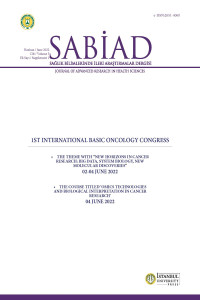Öz
The purpose of translational research is to test novel therapeutic strategies and drugs throughout basic and clinical research. The basic concept of translational research is ‘Bench to Bedside’, defining the collaboration between clinicians and basic scientists. That means translational research involves synergistic partnerships between industry, foundations, and public health services. The collaboration between partners provides a network structure that uses multiple methods and technologies to harmonize parameters such as complexity, expertise, safety, and efficiency with national regulations, institutional policies, and best practices that govern cell, animal, and human research. One might think that the ethics of translational research is simple because there are extensive rules regarding basic and clinical research ethics. Nevertheless, translational research brings new tools to the scene such as employing biomarkers based on omics technology and genomics. On the other hand, data science using real-world data, big data, data mining, and artificial intelligence is another huge leverage for translational research bringing new ethical and legal issues, especially concerning data protection. Therefore, new ethical issues arise that have not been addressed before. As the name reflects, translational research ethics should be considered as the means of a literal translation as well. Ethics should serve to translate the language used by different disciplines and moreover by all stakeholders including social areas from the public to the governmental bodies etc. to translate these different languages and attitudes to each other and make the science more transparent and reliable.
Anahtar Kelimeler
Kaynakça
- Wellek S, Blettner M. On the proper use of the crossover design in clinical trials: part 18 of a series on evaluation of scientific publications. Dtsch Arztebl Int. 2012;109(15):276-81
Öz
The purpose of translational research is to test novel therapeutic strategies and drugs throughout basic and clinical research. The basic concept of
translational research is ‘Bench to Bedside’, defining the collaboration between clinicians and basic scientists. That means translational research involves
synergistic partnerships between industry, foundations, and public health services. The collaboration between partners provides a network structure that
uses multiple methods and technologies to harmonize parameters such as complexity, expertise, safety, and efficiency with national regulations,
institutional policies, and best practices that govern cell, animal, and human research. One might think that the ethics of translational research is simple
because there are extensive rules regarding basic and clinical research ethics. Nevertheless, translational research brings new tools to the scene such as
employing biomarkers based on omics technology and genomics. On the other hand, data science using real-world data, big data, data mining, and artificial
intelligence is another huge leverage for translational research bringing new ethical and legal issues, especially concerning data protection. Therefore, new
ethical issues arise that have not been addressed before. As the name reflects, translational research ethics should be considered as the means of a literal
translation as well. Ethics should serve to translate the language used by different disciplines and moreover by all stakeholders including social areas from
the public to the governmental bodies etc. to translate these different languages and attitudes to each other and make the science more transparent and
reliable.
Anahtar Kelimeler
Kaynakça
- Wellek S, Blettner M. On the proper use of the crossover design in clinical trials: part 18 of a series on evaluation of scientific publications. Dtsch Arztebl Int. 2012;109(15):276-81
Ayrıntılar
| Birincil Dil | İngilizce |
|---|---|
| Konular | Klinik Tıp Bilimleri |
| Bölüm | Toplantı Özeti |
| Yazarlar | |
| Yayımlanma Tarihi | 9 Ağustos 2022 |
| Gönderilme Tarihi | 24 Haziran 2022 |
| Yayımlandığı Sayı | Yıl 2022 Cilt: 5 Sayı: S-1 |


